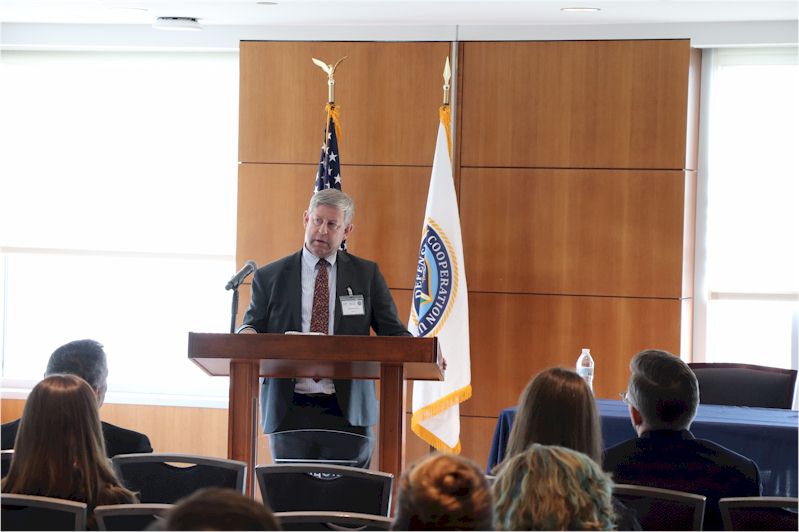Posted on: 11/10/2022
The 2022 Security Cooperation Conference, co-hosted by Defense Security Cooperation University and The George Washington University Elliott School of International Affairs, brought together approximately 130 security cooperation experts from across the policy, practitioner, and academic communities. The conference examined the state of security cooperation today; the implications of recent global security trends and demands on the security cooperation enterprise; and whether, and how, the Department of Defense (DoD) should adjust its approach to security cooperation in the future. The dialogue generated new thinking on frameworks, innovative approaches, and key challenges.
Speakers framed challenges facing the security cooperation community and provided opportunities for direct engagement on how the Department should adjust its approach to security cooperation in the future. Senior government leaders included Mara Karlin, Assistant Secretary of Defense for Strategy, Plans, and Capabilities; Dafna Rand, Director of Foreign Assistance, U.S. Department of State; James Hursch, Director of the Defense Security Cooperation Agency; Stanley Brown, Principal Deputy Assistant Secretary of State for Political-Military Affairs; Michelle Strucke, Deputy Assistant Secretary of Defense for Global Partnerships; and Celeste Gventer, President of the Defense Security Cooperation University (DSCU). Participants and panelists represented diverse perspectives from across the Department of Defense, interagency partners, industry, think tanks, and academia.
 DSCA Director James Hursch presents perspectives on the state of security cooperation today.
DSCA Director James Hursch presents perspectives on the state of security cooperation today.
The conference, held at The George Washington University’s Washington, DC, campus on October 18, 2022, explored the increasingly complex U.S. security cooperation environment. The end of the war in Afghanistan, the resurgence of state-on-state warfare in Ukraine, and the increasing threat of strategic competitors compel DoD to rethink how the United States cooperates with allies and partners to deter, deny, or defeat threats to national security. The 2022 U.S. National Defense Strategy (NDS) sets out how DoD will contribute to advancing and safeguarding vital U.S. national interests – protecting the American people, expanding America’s prosperity, and realizing and defending our democratic values – through integrated deterrence, campaigning, and actions that build enduring advantages for the future Joint Force.
The nation’s network of alliances and partnerships is arguably more important now than it has ever been, with increased competition in new domains (cyber and space), dangerous transboundary threats, including the challenges of climate security and COVID, novel emerging technologies, and a rise in authoritarianism around the world. The conference explored the extent to which these changes are era-defining, and the implications this has for security cooperation.
This inaugural 2022 Security Cooperation Conference demonstrates commitment by the DoD to promote critical inquiry and scholarship that improves the quality and professionalism of security cooperation. It is the first of a series of efforts DSCU is undertaking to bring diverse stakeholders together to begin to bridge the gaps between scholarship, policy, and practice.
 DSCU President Dr. Celeste Gventer presents her views on security cooperation.
DSCU President Dr. Celeste Gventer presents her views on security cooperation.
Three major themes ran through the conference discussions:
- how security cooperation contributes to the 2022 National Defense Strategy;
- integrating lessons learned and best practices in security cooperation approaches;
- professionalizing the security cooperation workforce.
First, speakers and panelists emphasized the central role that security cooperation plays in integrated deterrence, a key concept in the 2022 National Defense Strategy that emphasizes working even more closely with our unparalleled network of allies and partners to deter aggression. Panels reflected on the effectiveness of security cooperation, and the extent to which it works to complement other foreign policy tools. Understanding the potential for impact rooted in partnership realities, and how that applies to a changing global security environment, was foundational to discussions during the conference.
Second, conference participants debated various approaches and frameworks for increasing effectiveness of security cooperation efforts. This includes the centrality of understanding partner perspectives, incentives, co-development, and security sector governance to set the conditions for successful security cooperation partnerships. Conversations throughout the day reiterated the importance of building our evidence-base through assessment, monitoring, and evaluation efforts, addressing bureaucratic impediments to change within the DoD, and more effectively integrating institutional capacity building efforts. Panelists reflected on applicability of lessons learned and relevance of frameworks, such as that of “principal-agent”, to the new and changing priorities for security cooperation.
Third, discussion during various sessions recognized the foundational importance of a professional security cooperation workforce. The quality of training and education provided by our uniformed services and our professional military education institutions is renowned in comparison to our strategic competitors. Yet the Department continues to face shortfalls in effectively developing and managing its own security cooperation workforce. The increased reliance on successful security cooperation implement integrated deterrence approaches requires further investment in professionalizing the workforce responsible for assessment, planning, monitoring, execution, evaluation, and administration of security cooperation programs and activities.
Videos of the conference are available at SC Conference Videos. Those wishing access to these videos should contact the DSCU SC Conference Team at dsca.ncr.dscu.mbx.conference@mail.mil.